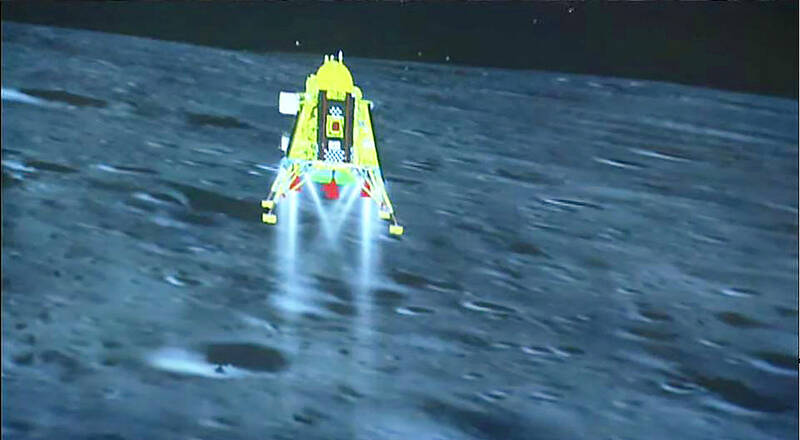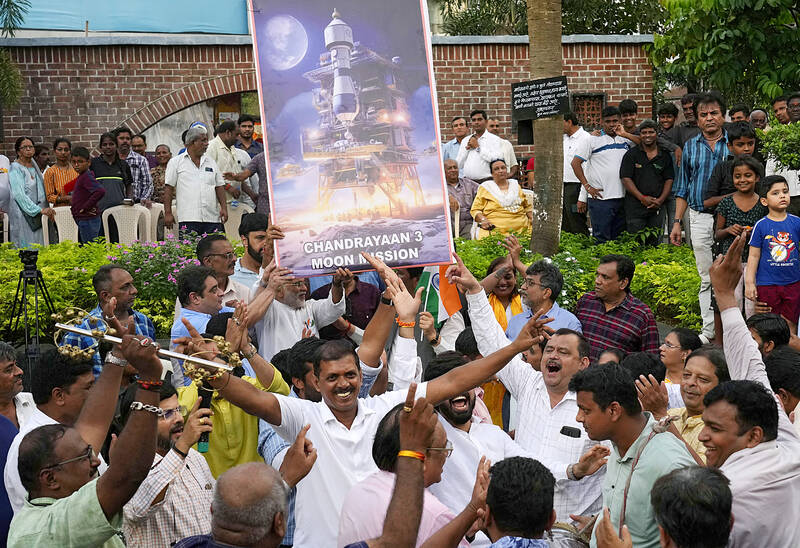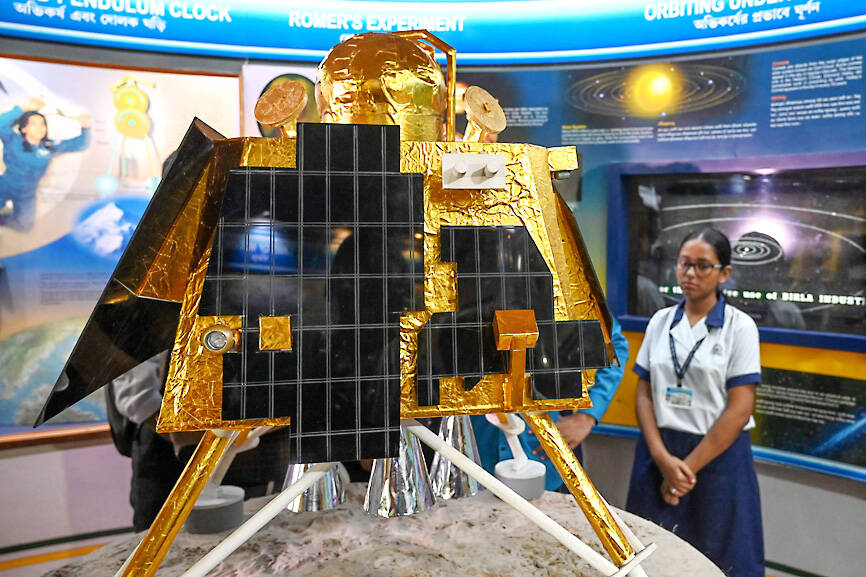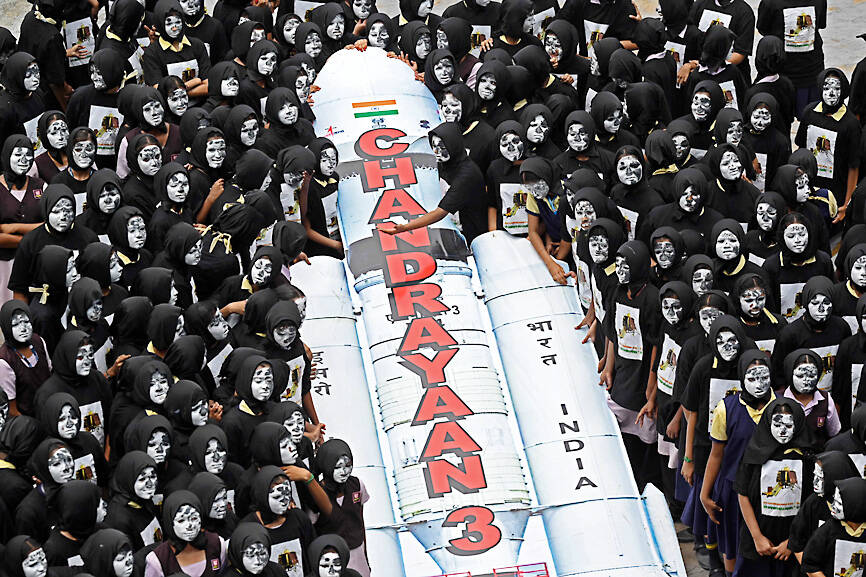India yesterday became the first nation to land a craft near the moon’s south pole, a historic triumph for the world’s most populous nation and its ambitious, cut-price space program.
The uncrewed Chandrayaan-3, which means “mooncraft” in Sanskrit, touched down at 12:34pm GMT as mission control technicians cheered wildly and embraced their colleagues.
Its landing comes days after a Russian probe crashed in the same region and four years since the previous Indian attempt failed at the last moment.

Photo by ISRO / AFP
Indian Prime Minister Narendra Modi smiled broadly and waved an Indian flag on a live broadcast to announce the mission’s success as a triumph that extended beyond his country’s borders.
“On this joyous occasion I would like to address the people of the world,” Modi said from the sidelines of the BRICS diplomatic summit in South Africa.
“India’s successful moon mission is not just India’s alone,” he said. “This success belongs to all of humanity.”

Photo: AP
The Chandrayaan-3 mission has captivated public attention since launching nearly six weeks ago in front of thousands of cheering spectators.
Politicians staged Hindu prayer rituals to wish for the mission’s success and schoolchildren followed the final moments of the landing from live broadcasts in classrooms.
Chandrayaan-3 took much longer to reach the moon than the Apollo missions in the 1960s and 1970s, which arrived in a matter of days.

Photo: AFP
India used rockets much less powerful than the ones the US used back then, meaning the probe had to orbit the Earth several times to gain speed before embarking on its month-long journey.
The lander, Vikram, which means “valor” in Sanskrit, detached from its propulsion module last week and has been sending images of the moon’s surface since entering lunar orbit on Aug. 5.
Now that Vikram has landed, a solar-powered rover would explore the surface and transmit data to Earth over its two-week lifespan.

Photo: AFP
India is closing in on milestones set by global space powers such as the US and Russia, conducting many of its missions at much lower price tags.
The South Asian nation has a comparatively low-budget space program, but one that has grown considerably in size and momentum since it first sent a probe to orbit the Moon in 2008. The latest mission cost US$74.6 million — far lower than those of other countries, and a testament to India’s frugal space engineering.
Experts say India can keep costs low by copying and adapting existing technology, and thanks to an abundance of highly skilled engineers who earn a fraction of their foreign counterparts’ wages.

SECURITY: As China is ‘reshaping’ Hong Kong’s population, Taiwan must raise the eligibility threshold for applications from Hong Kongers, Chiu Chui-cheng said When Hong Kong and Macau citizens apply for residency in Taiwan, it would be under a new category that includes a “national security observation period,” Mainland Affairs Council (MAC) Minister Chiu Chui-cheng (邱垂正) said yesterday. President William Lai (賴清德) on March 13 announced 17 strategies to counter China’s aggression toward Taiwan, including incorporating national security considerations into the review process for residency applications from Hong Kong and Macau citizens. The situation in Hong Kong is constantly changing, Chiu said to media yesterday on the sidelines of the Taipei Technology Run hosted by the Taipei Neihu Technology Park Development Association. With

CARROT AND STICK: While unrelenting in its military threats, China attracted nearly 40,000 Taiwanese to over 400 business events last year Nearly 40,000 Taiwanese last year joined industry events in China, such as conferences and trade fairs, supported by the Chinese government, a study showed yesterday, as Beijing ramps up a charm offensive toward Taipei alongside military pressure. China has long taken a carrot-and-stick approach to Taiwan, threatening it with the prospect of military action while reaching out to those it believes are amenable to Beijing’s point of view. Taiwanese security officials are wary of what they see as Beijing’s influence campaigns to sway public opinion after Taipei and Beijing gradually resumed travel links halted by the COVID-19 pandemic, but the scale of

A US Marine Corps regiment equipped with Naval Strike Missiles (NSM) is set to participate in the upcoming Balikatan 25 exercise in the Luzon Strait, marking the system’s first-ever deployment in the Philippines. US and Philippine officials have separately confirmed that the Navy Marine Expeditionary Ship Interdiction System (NMESIS) — the mobile launch platform for the Naval Strike Missile — would take part in the joint exercise. The missiles are being deployed to “a strategic first island chain chokepoint” in the waters between Taiwan proper and the Philippines, US-based Naval News reported. “The Luzon Strait and Bashi Channel represent a critical access

Pope Francis is be laid to rest on Saturday after lying in state for three days in St Peter’s Basilica, where the faithful are expected to flock to pay their respects to history’s first Latin American pontiff. The cardinals met yesterday in the Vatican’s synod hall to chart the next steps before a conclave begins to choose Francis’ successor, as condolences poured in from around the world. According to current norms, the conclave must begin between May 5 and 10. The cardinals set the funeral for Saturday at 10am in St Peter’s Square, to be celebrated by the dean of the College